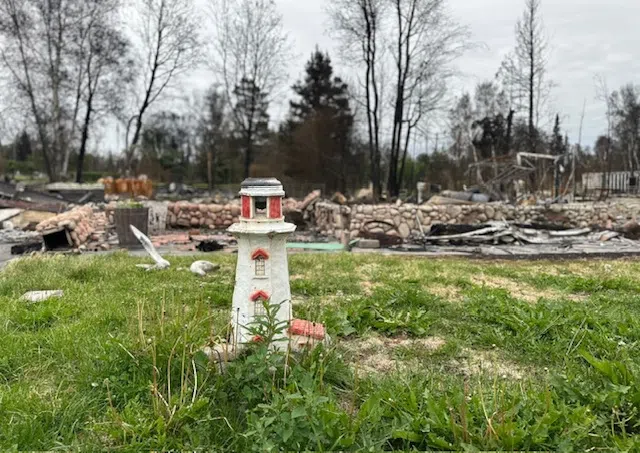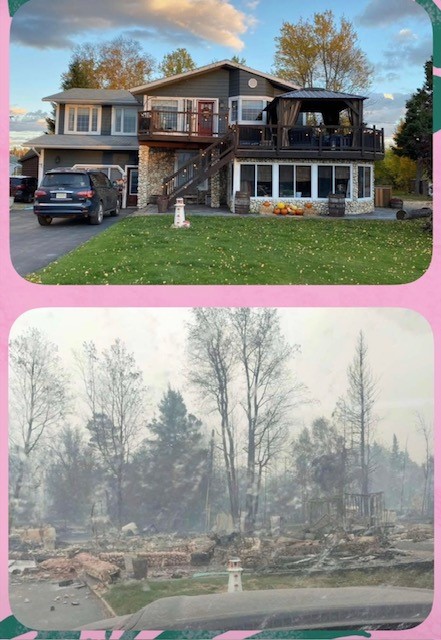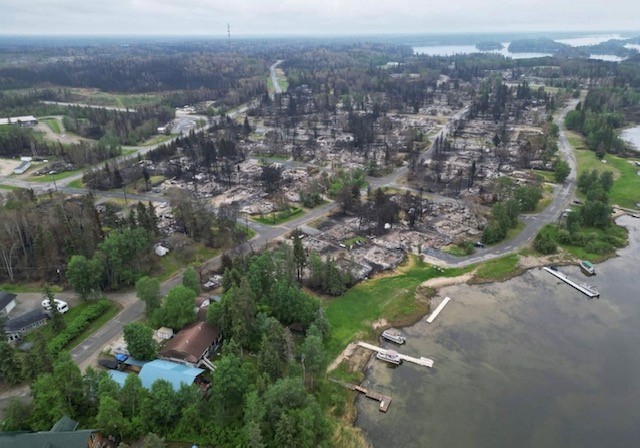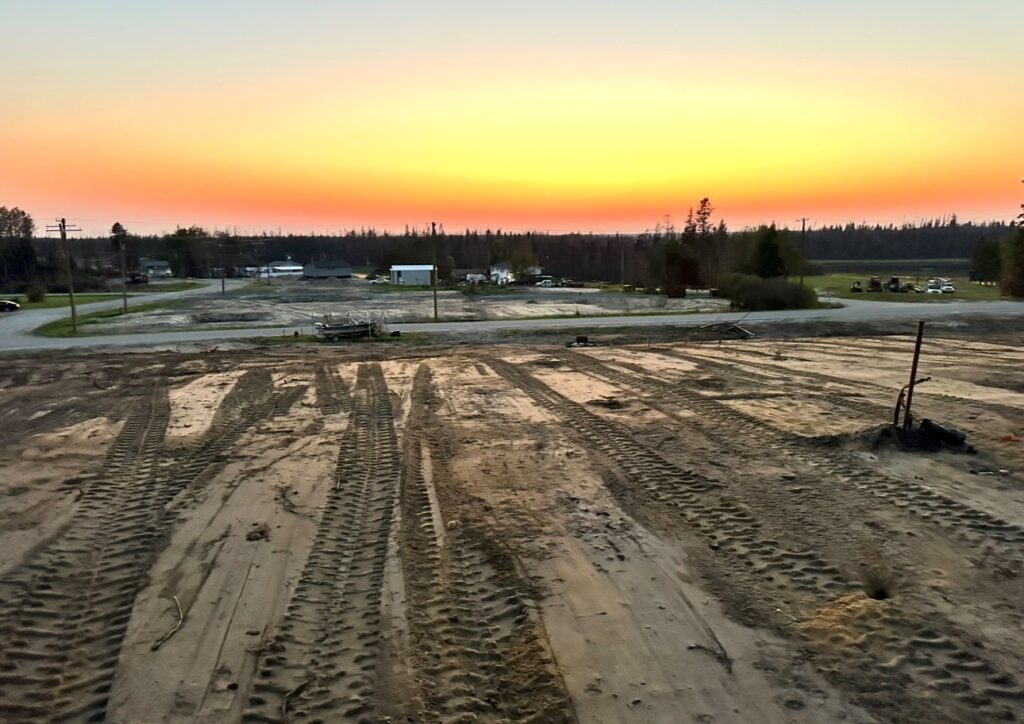Flin Flon General Hospital MLT, Rhonda W., lost everything she owned in this summer’s Northern wildfires.
Rhonda is a MAHCP member and General Duty Medical Laboratory Technologist at the Flin Flon General Hospital, and she has lived in Denare Beach, Saskatchewan, for almost 30 years. Her children were raised there, she’s spent her entire career in Flin Flon, and her friends and community mean everything to her.
After this summer’s raging Northern wildfires ravaged her community and turned to ash roughly two-thirds of the town’s homes, people are rebuilding, but Rhonda says it will never be the same for her.
“The first time I went home after the fire was the hardest. Almost my whole community is gone. It did seem to get easier, but the last time I went back, it didn’t feel like home anymore. It looks like a brand-new development; it’s all flat, all the trees are gone, and you can’t tell one lot from another. It was a really beautiful lake community full of trees. I don’t even want to go back at this point.”
Rhonda says she’s trying to force herself to look at house plans and make decisions about rebuilding, but she gets overwhelmed.
“Denare Beach was full of unique little cottages and houses, and now it’s just going to be RTMs and newly built. And it’s like my body won’t let me move forward with the planning. Everyone deals with trauma on different timelines, and I am allowed to be angry and sad. Honestly, I’m worried that a fire could happen again, actually, that a fire will happen again, and although I absolutely love living in the North, maybe it isn’t right anymore.”
“No one really saw it coming”
On May 28, Denare Beach was on evacuation watch, even though no one really considered the town to be in danger of burning down.
“I came home from the gym about 4 pm to a mandatory evacuation order, because our access road was being compromised by a fire. I didn’t take anything with me other than the animals. I was gone in an hour, almost completely empty-handed, thinking I’d be back in two days. I didn’t even take a last look at my house.”
Fifteen thousand people were trying to leave at the same time on the one road out remaining. From Flin Flon to The Pas usually takes a bit more than an hour and it took Rhonda more than three hours that day. It was literally car to car to car.
It wasn’t until May 30 that a separate fire, the Wolf fire, which started near Foran Mine in the middle of May, began to travel rapidly towards Denare Beach, fueled by strong, shifting winds. It was that fire that took out the town, and almost everything that meant anything to Rhonda.
“My wedding dress, my engagement ring, most of my photos of the family, every unique vintage treasure I used to decorate my home… I don’t like anything cookie-cutter, so everything was special and original. There really wasn’t an opportunity to collect up anything other than the dogs and cats when I left. But no one was hurt – that’s all that matters.”
Rhonda was born and raised in Gimli, Manitoba, and all her extended family still resides there. She is very thankful to be able to travel to Gimli when she hit the road in a car full of dog and cat crates. She is now able to stay with them. Her immediate family includes four rescue cats and two dogs, and as a very active member of the local SPCA, she also packed up two more cats who needed shelter.
Rhonda’s husband stayed in Denare Beach until Saturday, when the authorities were getting very serious and going house to house warning people to get out. A few residents and 11 firefighters remained in the community throughout the Category 6 fire. One resident is credited with saving roughly one-third of the town’s homes.
“It all would have burnt if he hadn’t been there! My husband wanted to stay too, and I was getting mad. I told him he’s an idiot, and that I didn’t care if he saved our house. If you’re going to help an old lady, or try to rescue trapped pets, that’s commendable. But to try to save a house? I don’t care about that.”
Government missteps; Poor communication
According to Rhonda, there were many weaknesses in the government’s wildfire response.
“Our Premier (Scott Moe) hasn’t even visited the disaster site, so we feel abandoned. And the overall lack of emergency preparedness scares me for the future. Is this going to happen again? What if we rebuild, and in 10 years, we’re ready to sell but no one wants to buy the house? What are our insurance premiums going to be like after this, or are we even going to be able to get insurance? There’s a lot to consider.”
Then, there is Shared Health’s approach to managing displaced employees.
“The fact that we needed to use vacation time, unpaid leave, request a leave of absence, or personally try to make our own alternative work arrangements to earn a paycheque — that has been extremely difficult. I know people who are in extreme financial distress now because of the fires, and I don’t think that’s right.”
After the evacuation, Rhonda went to work for one week in the Gimli Hospital lab, but she couldn’t focus and it was simply too stressful for her to try to work. She spoke with her charge at the Flin Flon General Hospital, and since the team is so short-staffed, together, they came up with an arrangement that would work for both of them.
“I am a 0.3 EFT, so I am driving to the Flin Flon lab to work one week out of every four. It’s an eight-hour drive which feels very long, but I love my job and I love the people. I’ve been there 26 years, and I’ve never really worked anywhere else.”
Since there are more than 230 displaced Denare Beach families, area rental accommodations are booked up. When in Flin Flon, Rhonda stays on her houseboat, which is fine for now, but clearly not a good long-term solution.
“I hope to be able to stay in our neighbours’ winterized garage suite over the winter when I need to be in Flin Flon for work. I’m actually more concerned about the drive to and from there. What if I’m scheduled and there’s a snowstorm? The other layer of stress on me is that I’m basically in a part-time marriage right now. My husband is a heavy equipment operator and is assisting with the wildfire clean-up in Denare Beach, so we are living apart for three weeks at a time. This has been tough, so I’m spending my time trying to deal with the overwhelming insurance claim.”
The claim process involves documenting every item they had in their home right down to wooden spoons, furniture, knick-knacks, socks — where they bought it, how old it was, how much it cost…
“I understand the wildfire was an unprecedented event, but I would like to see something in our collective agreement about emergency planning and management, as well as protection for members facing mandatory evacuations. Plans have to be tested and connected across the health regions, and they should include detail about how the employer handles displaced employees. Quite honestly, no one who has been through a crisis like this is in the right frame of mind to go to work providing patient care, especially at a different site where you don’t know the equipment. If your mind isn’t there, you’re just putting patients at risk.”
Throughout the crisis, Rhonda says communication from the employer was abysmal. No one knew what to do. Some people went to Winnipeg, some were told Winnipeg wasn’t accepting anyone. Some went to Dauphin, where they paid for their own accommodations while working and struggled to figure out caregiving arrangements for their kids. The lowest-seniority employee at the Flin Flon lab stayed behind to shut down, receiving overtime pay rather than hazard pay, risking her own safety after the evacuation order was issued.
“We were told we’d only get paid for 72 hours after evacuation. After that we’d have to either take vacation, banked time, or unpaid leave. None of that is fair; it’s an insult actually. Shared Health said they’d try to find us work in other Shared Health sites that were evacuated to. Problem #1: We’re a border town so some of us evacuated to Saskatchewan. Problem #2: The last thing on our minds was trying to go to work elsewhere when our houses could be burning down. Problem #3: Sites in Winnipeg initially denied people work placements, then a couple of weeks later, they said they were willing to onboard some of us. By that time, most people had made alternate arrangements. We needed the government to step in.”
In total, Rhonda’s lab was evacuated for four weeks and it took the team a week to get it back up and running, disposing of expired reagents and samples, and cleaning and recalibrating the equipment. Meanwhile, the hospital was buzzing around them because Northern Health Region employees returned to work roughly 10 days before Shared Health employees. Emergency department staff and patients were frustrated because the hospital was unable to provide clinic lab services. And of course, lab staff put in considerable overtime to get everything operational.
Although she typically picks up additional shifts to address vacancies and ensure access to diagnostics, Rhonda says she’s not picking up at this point.
“I’m staying on a houseboat, which feels like camping. I like camping, but it’s just not appealing to me to stay there for any longer than a six-day stretch at a time.”
All the challenges aside, from Rhonda’s perspective, she has been fortunate personally.
“My employer has been very accommodating; I have an accommodation for a year. Flin Flon Hospital covered the cost of my shifts in Gimli; they didn’t have to do that. Employers are not required to do any of that, so as union members, we need to be advocating for some of this to be built into our contract.”

This lighthouse, a wedding gift given to Rhonda and her husband, somehow remained intact while everything around it burned.



